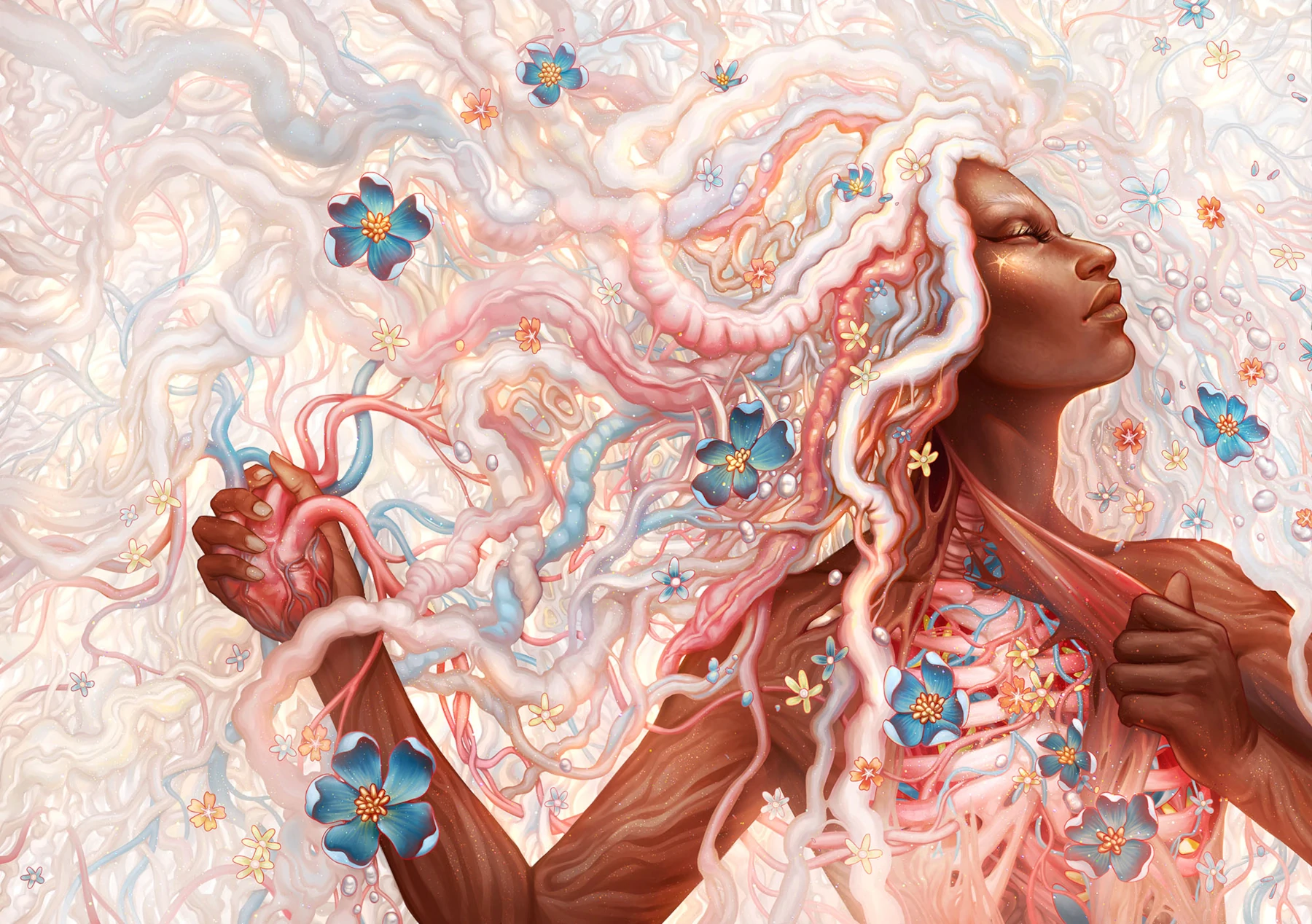
Meet Our Spring 2024 Interns!
Words By Ari Iscariot, Asma Al-Masyabi, Ciena Valenzuela-Peterson, Jazzmin Joya, Stevi Sargas
If you’ve ever met one of our wonderful F(r)iction staffers, you’ll quickly learn that almost every one of them was once an intern in our Publishing Internship Program.
This program is run by our parent nonprofit organization, Brink Literacy Project. While our publishing internships are a great way to get a crash course in the literary industry, they can often provide a path to what can become a long and rewarding professional relationship. For more information, please visit the internship page on the Brink website.
Ari Iscariot
they/them
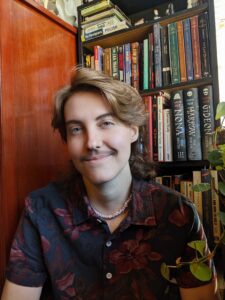
What is your favorite place to read?
I don’t think I have any favorite physical place I like to read—I tend to read wherever I am, on transportation, walking through a city, in the middle of a restaurant, etc. I’m liable to walk into oncoming traffic if engrossed enough in a good book. However, I do like to read best at night, when the world is quiet. So, I’d say my favorite place to read is the liminal space between sleeping and waking, the time before dawn when the dark brims with secret possibility.
You’re walking down the street and suddenly spot a key on the ground! What does it look like? What do you do with it?
It wouldn’t look like a stereotypical key. It would lie shivering on the pavement, a glittering starburst, pearlescent as opalite. I would hold it in my two hands and see ghost valleys and nebula nurseries in its reflections, and it would whisper in my mind: “I am the key to understanding. Here is what you can say to every living thing in order to be seen. Here is the knowledge of infinity and the spells that will allow you to keep it all in your tiny, human brain.” And I would use the key to learn all that can be learned, and to connect with every lonely human being who feels misunderstood.
How do you take your coffee? If you don’t drink coffee, describe your favorite beverage ritual.
Not so much a ritual as a ritual sacrifice but—my favorite beverage experience was buying my partner a small chocolate penguin that would melt into a cocoa drink, and then dramatically enacting his screams as he melted into her milk. 15/10 would sacrifice again.
What is your favorite English word and why? Do you have a favorite word in another language?
My favorite word changes frequently, but right now I’m particularly fond of “purulent.” I like to pair it with the imagery of a festering, putrescent mouth that cannot help but reveal a character’s deepest, most shameful feelings. The word reminds me of one of my favorite quotes by an author friend of mine, Phoenix Mendoza. “You cock your head, astounded by the tenor of your own voice, all that’s seeping through the careful white bandage you keep taped over the wound of your mouth.” I love the idea of the mouth as a wound, a sore, an infection, unable to be concealed or healed.
My favorite word in another language is “L’esprit de l’escalier,” which is French for “staircase wit.” It is meant to describe the feeling one gets when they leave an argument, and then come up with the perfect reply at the bottom of the stairwell: aka, when it is already too late.
You’re on a deserted island. You have one album and one book. What are they and why?
If I was on a deserted island, I’d want a book that felt like an old friend to keep me company. It’s perhaps not the most well-written or intellectually stimulating, but I read Catherine Cookson’s The Girl about a dozen times when I was younger, and even now reading it feels like sinking into a warm embrace. The album I’d choose is Everything is Fine by Amigo the Devil, simply because my favorite genre is murderfolk and I don’t believe Danny Kiranos has ever made a bad song. His lyrics are nearly literary in their poeticism, and in the way they transform the ugly into the divine.
If you could change one thing about the literary industry, what would it be?
I would make the industry more expansive, daring, and accepting. So often I see books chosen because they are written to market, because they fit modern conventions of “good writing,” because they’re written by an author that will appeal to what the industry believes is their largest demographic. Stories that are unconventional, uncomfortable, and uncompromising are often neglected and unrecognized. We need stories that defy the status quo, that speak their own truth, that are written by diverse voices. We need to prioritize creativity over marketability, and passion over profit.
Asma Al-Masyabi
she/her
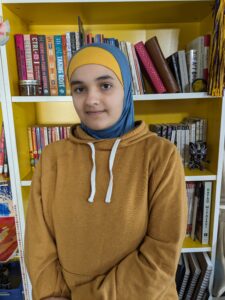
What is your favorite place to read?
I like to sit in any quiet moment with a book. If I had to pick a favorite place, it would be on the couch under a fuzzy blanket.
You’re walking down the street and suddenly spot a key on the ground! What does it look like? What do you do with it?
It is small and silver, and the handle twists into the shape of a “Y.” I pick it up and suddenly, I am alone. The sidewalk has been replaced by the decaying undergrowth of an old forest, and the branches of tall, dark trees braid over where there used to be sky. I stare and wonder if I was hit by a car as I crouch over the key, but a small, sweet voice coming from just beyond the tree line distracts me. “Darling,” it sings. “We’ve been waiting for you for so, so long.”
How do you take your coffee? If you don’t drink coffee, describe your favorite beverage ritual.
A hot Earl Grey tea with extra honey and a splash of vanilla at a temperature just between warm and hot. The only thing that could make it better is a freshly baked chocolate chip cookie.
What is your favorite English word and why? Do you have a favorite word in another language?
“Serendipity” is a fun word to say and use. Even if it’s just a five-syllable word, it feels like a small, balanced song. Also, who wouldn’t like a bit of serendipity? As for a non-English word, I’m always learning new Arabic words, so my favorite shifts a lot. The most recent would be “’anani,” which means selfish, but I like the way it rolls off the tongue.
You’re on a deserted island. You have one album and one book. What are they and why?
Album – The Poetry of Maya Angelou. After a long day of making a shelter, finding food and water, and struggling to start a fire, I can think of no better companion than the strength and beauty of Maya Angelou’s voice.
Book – John Green’s The Anthropocene Reviewed. I’d be able to read this book of essays in bite-sized pieces that would leave me satisfied, but still allow me to make it last however long I’m stranded for. It would also remind me of how wonderful and strange being a human on this earth can be.
If you could change one thing about the literary industry, what would it be?
Often, the literary industry is reluctant to take risks and publish work that is unusual or doesn’t fit current trends. I think there should be a bigger embrace of original stories, and creators, because that’s what readers really want (at least, it’s what I want).
Ciena Valenzuela-Peterson
she/her
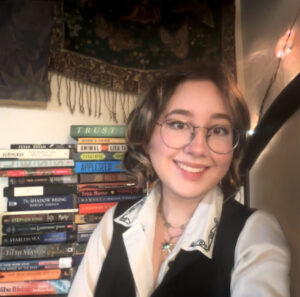
What is your favorite place to read?
I’ve tried to be the kind of person who reads in cafés, I’ve read outdoors among the trees, I’ve hauled myself across campus to read in the fanciest library—and while those reading spots provide a certain literary flare, nothing compares to the pleasure and comfort of reading in bed. My bed is a cozy, pillowy cocoon, over-adorned with cushions and string lights and a canopy ceiling of tasseled scarves. It’s the perfect little nest for curling up with a good book.
You’re walking down the street and suddenly spot a key on the ground! What does it look like? What do you do with it?
The key catches my attention because it’s old—a sturdy, brass object with two bulky, uncomplicated teeth that mark it as antique. In this day and age, a key like that isn’t keeping anything secure. Maybe it’s a skeleton key to an old manor, or just a movie prop—either way, I admire the embossed detail along the handle, the ornate bow made to fit fingers instead of keychains. I pocket it. I’ll take it home and draw it, keep it in an envelope in my bullet journal, or loop a chain through it and wear it as jewelry.
How do you take your coffee? If you don’t drink coffee, describe your favorite beverage ritual.
I am embarrassed to admit that my current morning coffee consists of Keurig-brewed coffee, non-dairy creamer, and a scoop of vanilla-flavored protein powder. It’s sacrilege, I know, but as a vegetarian it’s a great way to boost my daily protein intake. I’ll miss breakfast routinely, but I’ll never miss my morning coffee.
What is your favorite English word and why? Do you have a favorite word in another language?
I am fond of the word “affectation.” I’ve always been interested in the concept of authenticity, and when I learned the word affectation in high school, I instantly recognized what a useful word it is, and it’s remained one of my favorites ever since.
You’re on a deserted island. You have one album and one book. What are they and why?
If I absolutely had to choose, I would bring My Chemical Romance’s The Black Parade as my album. I can only imagine the circumstances that would allow me to listen to an album on a deserted island but not escape said island, but maybe a portable CD player washed up on shore or I fashioned a turntable from bamboo George of the Jungle-style. Either way, I’d be dying of anxiety if not starvation and would want the comfort of one of my all-time favorite bands from my adolescence. The Black Parade withstood the test of time and the end of my emo phase and remains an incredible album by an incredible band.
As for a book, I’d bring a bushcraft survival guide with tips for foraging for edible mushrooms and building shelters and such. Otherwise, I’d be doomed so quickly I wouldn’t have time to read any other book for fun.
If you could change one thing about the literary industry, what would it be?
In the literary industry, we’re in the business of art curation, and with the profit incentive taking over publishing we’ve lost sight of that. More and more books are being churned out by Big-5 publishers (and self-published authors imitating them) that are so generic they can be boiled down to a series of tropes and nothing more. Everything needs a successful “comp” that’s gone viral on BookTok, and publishing houses run by advertisers are growing more and more wary of artistic risk. If we only publish books based on what has sold in the past, there’s no way to discover “the next big thing.” Publishing is too slow of a business to rely on the trend cycle for leveraging risk, and the outcome is watered-down trope-driven books taking priority over fresh and important literary voices.
Jazzmin Joya
she/her
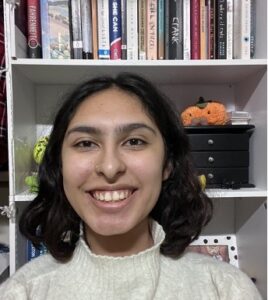
What is your favorite place to read?
My favorite place to read is the library. I spent a lot of time growing up in the library and it led me to pursue English as a degree! So to me, I think the library is just a fun, cozy environment for me to read in.
You’re walking down the street and suddenly spot a key on the ground! What does it look like? What do you do with it?
If I a spotted a key on a walk, it would be an old, bronze skeleton key that would allow me to open any door and transport to any place through that door.
How do you take your coffee? If you don’t drink coffee, describe your favorite beverage ritual.
I don’t drink coffee but I do enjoy making a nice warm tea, especially at night when I’m winding down. My tea ritual is to warm up water, choose a tea (usually chamomile or green tea), and add honey and a slice of lemon!
What is your favorite English word and why? Do you have a favorite word in another language?
My favorite English word is “onomatopoeia,” I think it’s a fun literary effect and sounds nice.
You’re on a deserted island. You have one album and one book. What are they and why?
If I were stranded on a deserted island my one album would be Mac Miller’s Circles. My one book would also be The Book Thief, I’ve read it so many times, but I could never get tired of it.
If you could change one thing about the literary industry, what would it be?
I would try to increase the diversity within the literary industry to amplify the voices of many authors who have amazing stories to tell which can increase the diversity in stories, characters, and settings.
Stevi Sargas
she/they
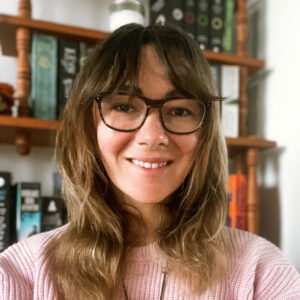
What is your favorite place to read?
I love to listen to audiobooks while exercising, at the gym or at home.
You’re walking down the street and suddenly spot a key on the ground! What does it look like? What do you do with it?
It’s a gold-colored house key. I’d probably leave it where it is, in case the person who dropped is retracing their steps.
How do you take your coffee? If you don’t drink coffee, describe your favourite beverage ritual.
I love coffee so I take it all sorts of ways. Mostly black, but sometimes as a flat white, hot or iced, and occasionally with syrup when I need a real energy boost.
What is your favorite English word and why? Do you have a favorite word in another language?
I like the word sombre. It’s pleasant to say, and I feel like its sound matches its meaning.
You’re on a deserted island. You have one album and one book. What are they and why?
This Is How You Lose the Time War by Amal-El-Mohtar and Max Gladstone is my book. It was my favorite read last year—I found it uplifting and inspirational. My album is See Without Eyes by the Glitch Mob. It’s one of my favorites to get me into a flow state. Something to keep my spirits up paired with something to keep me productive seems like a good combination.
If you could change one thing about the literary industry, what would it be?
I’d love for more people to be able to get into the industry. If I could snap my fingers and simply have it happen, I’d add a whole lot of funding for education and publishing opportunities.